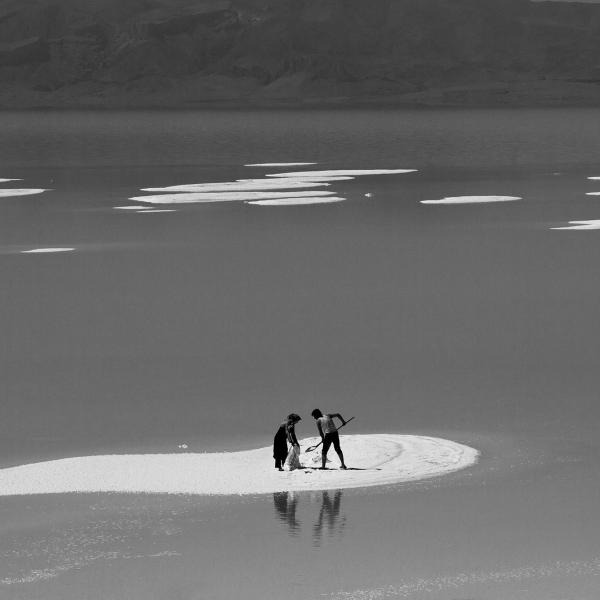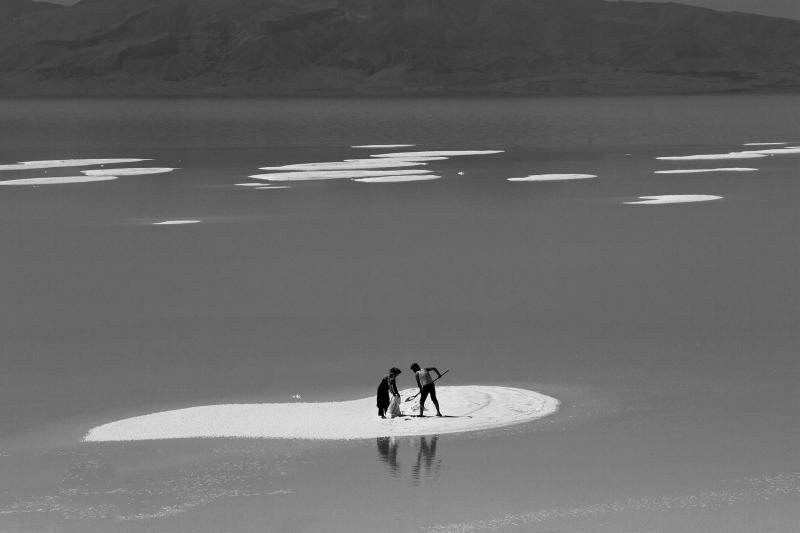Learning from the desert
International Symposium. Architecture, Water, Territories
In the face of global water scarcity and the increasing aridification of many regions around the world, this symposium seeks to question the productivist and short-term logics that dominate current water-management practices.

To do so, we invite an in-depth analysis of land-development cases in arid and semi-arid regions, moving beyond the purely technical dimensions of planning to encompass the broader research, knowledge systems, and dynamics that shape territorial organization in arid environments.
According to the 2022 United Nations World Water Development Report, since the beginning of the 20th century, global water withdrawals for domestic, agricultural, and industrial uses have increased more than sixfold. It is now estimated that over two billion people face water shortages each year, particularly during heatwaves that increasingly affect many territories around the globe.
While the overall rise in temperatures is one of the main causes of this generalized “desertification,” research shows that the productivist logics that have dominated water-management planning have significantly contributed to its worsening.
Although this productivist approach to land development has dominated since the mid-20th century—even in arid regions—it was not always so. For millennia, in arid regions that were originally hostile to life, territorial development primarily aimed to preserve hydric balances, without which the establishment of human societies would have been impossible. In many cases, territorial planning in arid regions succeeded in bringing water, shade, air, and vegetation where none existed. Architecture and urbanism then became tools for sustaining—or even creating—durable ecosystems in which human societies and the living world as a whole could thrive.
Throughout these two days, we invite you to explore a rich selection of traditional water structures and systems developed in arid environments across several continents, encouraging a collective reflection on what the desert can teach us in addressing today’s global water crisis.
An exceptional exhibition of works by Iranian photographer Romin Mohtasham, winner of the ‘Water in Iran’ competition organised by the Parisian gallery Ithaque and the Franco-Iranian Centre, will accompany all of the presentations.
This symposium is the result of a collaboration between several partners: the BER of the Ministry of Culture, the LéaV of ENSA Paris-Versailles, the Cité de l’architecture et du patrimoine, the Régie de l’Eau Paris Est, Galerie Ithaque, and the Water Academy.
Organizing Committee
- Aida Tavakoli, architect (DEA), PhD candidate at LéaV, ÉNSA Versailles (doctoral contract EUR HCP, CY University)
- Bita Azimi, Associate Professor at ÉNSA Paris-Belleville, member of the Scientific Advisory Board of the Cité de l’architecture et du patrimoine
- Alessandro Livraghi, architect, lecturer, PhD candidate at LéaV, ÉNSA Versailles (doctoral contract EUR HCP, CY University)
Scientific Committee
- AZIMI Bita: Associate Professor at ÉNSA Paris-Belleville, member of the Scientific Advisory Board of the Cité de l’architecture et du patrimoine
- STACHER Susanne: Professor and HDR researcher at ÉNSA Paris-Versailles, member of LéaV
- DELALEX Gilles: Professor at ENSA Paris-Malaquais – Co-Director of the LIAT Laboratory
- LANE Shahinda: Architect and urban planner, Associate Professor at the Conservatoire National des Arts et Métiers
- ARYA Meghal: Principal architect, co-founder of Arya Architects, Professor at CEPT University (India)
- GIANNINI Alessandra : PhD in Earth and Environmental Sciences, CERES, École Normale Supérieure, Paris
- MAZZONI Christiana : Professor and HDR researcher, Director of the Chair “Metropolises and Architecture of Major Events” (MAGE-Paris 2024) at IPRAUS, ENSA Paris-Belleville, Director of UMR AUSser
- ABEDI Sina : Architect DE, PhD in architecture, President of the Gondishapour Association
- OLIVA Jean-Claude: President of the Board of Directors of the Public Water and Sanitation Authority of Est Ensemble, Eau publique par Est Ensemble
Invited Speakers
- Paola Vigano, architect, urban planner, and Professor at EPFL Lausanne
- Attilio Petruccioli, Professor at Sapienza University of Rome, Director of the Islamic Environmental Design Research Center
- Meghal Arya, Principal architect, co-founder of Arya Architects, Professor at CEPT University, Ahmedabad, India
- Pooja Bhati & Maulik Sisodia, directors at Tarun Bharat Sangh, an organization founded by Rajendra Singh, the "Waterman of India", Jaipur, India
Program
Thursday, December 4, 2025
9:30–10:00 : Welcome
10:00 : Opening remarks by the Cité’s leadership and Aïda Tavakoli, architect, doctoral researcher, and co-organizer
10:30 : Mythological Floods, by Marc Brabant, artist, architect, and PhD in philosophy
10:50 : Virdas of Banni: Vernacular Water Knowledge and Hydrosocial Ethics in Arid Landscapes, by Bhadra Manali, Navrachana University, Gujarat, India
11:10 : Coffee break
11:30 : Shoushtar: A Waltz Between Semi-Aridity and Flooding – Geo-historical and Archaeological Approaches, by Zahra Wejdani, PhD in architecture
11:50 : Brine, Belonging, and Ephemeral Territories: Indigenous Salt Landscapes of the Indian Desert, by Adreja Dey & Priyanka Kanhare, CEPT University, Ahmedabad
12:10 : The Oasis Paradox – From Bulwarks Against the Desert to Deserted Places, by Salim Zniber, architect
12:30: Learning from Rajasthan: Studying Rainwater-Harvesting Structures. Rethinking Fieldwork, by Savitri Jalais, ENSA Toulouse
12:50 : Lunch break
14:00 : Round table with morning speakers
14:45 : Lecture by Meghal Arya
15:30 : Coffee break
16:00 : Screening of the short documentary Paanee, directed by Aïda Tavakoli (fieldwork, October 2024)
16:15 : Lecture by Pooja Bhati & Maulik Sisodia, Tarun Bharat Sangh
17:00 : End of Day 1
Friday, December 5, 2025
9:30–10:00: Welcome
10:00: Opening remarks by the organizing committee
10:30 : In Nablus: The Potentials of Hybridization Within an Ancient Built System, by Ondine Touja, architect and PhD candidate, ENSA Grenoble
10:50 : Aquifer Recharge: A Millennia-Old Water Architecture, by Ayda Alehashemi, co-coordinator of the Water Architectures Chair, ENSA Paris-Malaquais–PSL
11:10 : Coffee break
11:30 : Territorial Adaptation and Water Architecture: Analyzing Tera Village’s Hydrological System in Western India, by Prakhar Vidyarthi, Associate Professor at PIAR, Parul University, India
11:50 : Hydropolitics and Agricultural Modernization in Morocco, by Youssef Tibourki, EAVT Paris-Est
12:10 : The Water Cycle and Territorial Specificity in Yagoua (Cameroon): Rethinking Hydraulic and Architectural Planning in a Semi-Arid Region, by Moise Kaardi Dkamdi, PhD candidate, LAVUE-CRH, Paris Nanterre University
12:30: The Persian Garden as Co-Elicitation of a World: A Mesological Reading*, by Shabnam Rahbarbehbahani, Assistant Professor, University of Montreal
12:50: Lunch break
14:00: Round table with morning speakers
14:45: Lecture by Attilio Petruccioli
15:30: Screening of the film Il padiglione dell’acqua (The Water Pavilion)
16:30: Lecture by Paola Vigano
17:30: Closing remarks and end of symposium
Visitor information
-
Auditorium
7, avenue Albert de Mun 75116 Paris
Accès côté jardins
Métro Iéna ou Trocadéro


